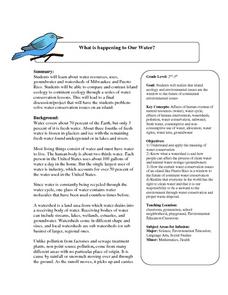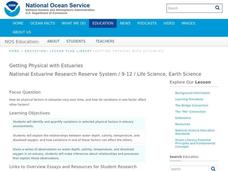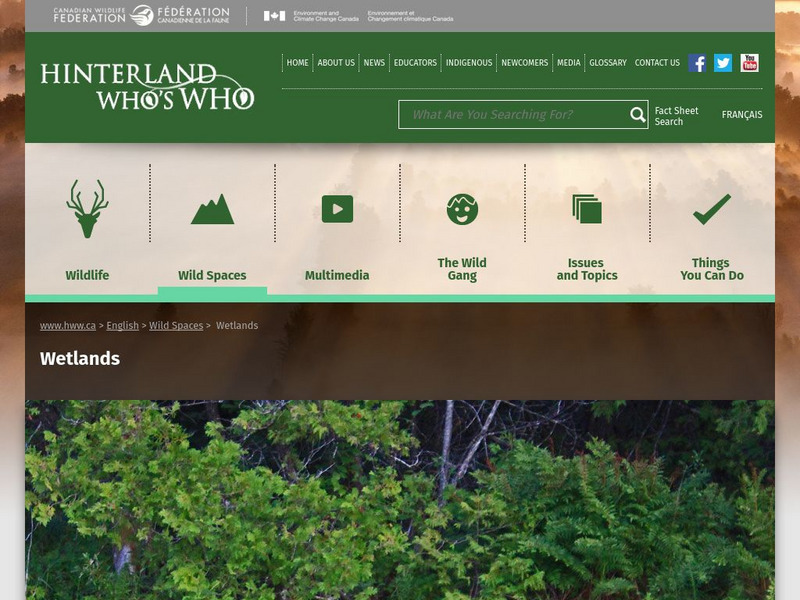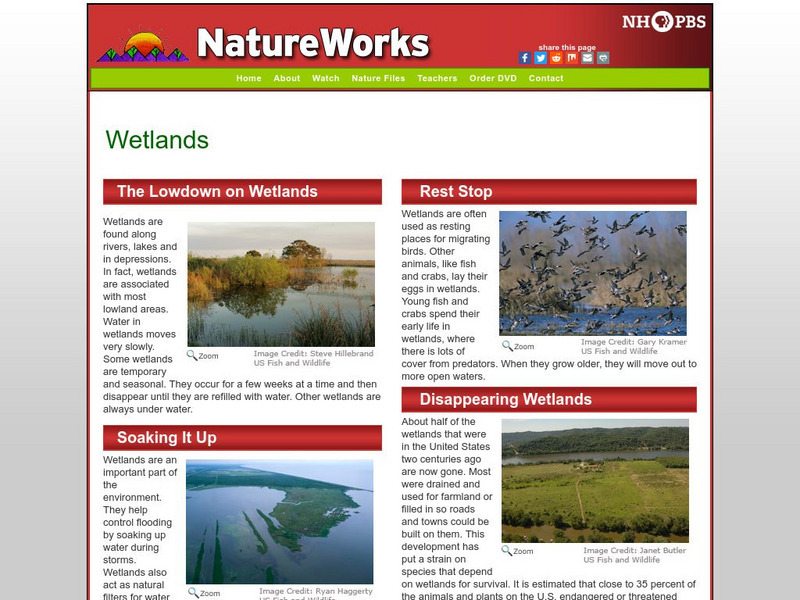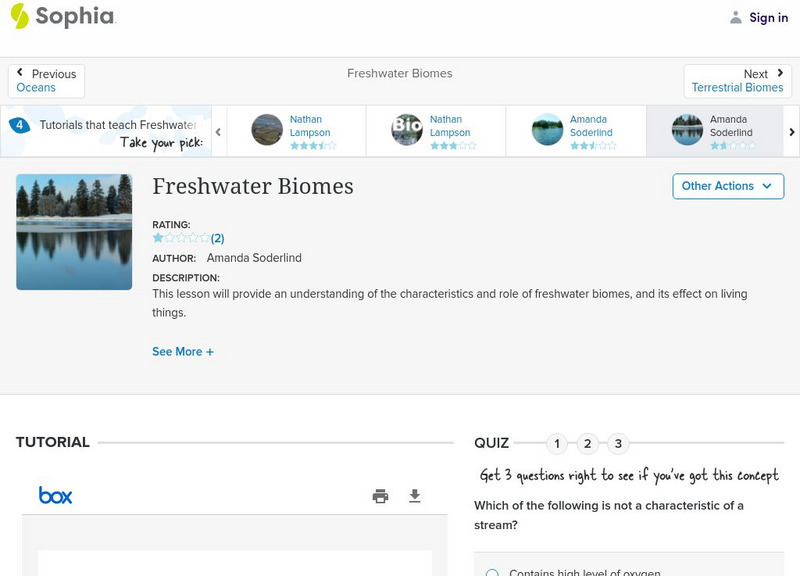Curated OER
What is Happening to Our Water?
Students compare and contrast Wisconsin's water resources to that of Puerto Rico. They research books about islands, particularly the Puerto Rican islands. Student view illustrations of island ecology. They discuss the illustrations and...
Curated OER
Getting Physical with Estuaries
Students study estuaries and how the physical factors change over time. In this investigative lesson students use a website to gain knowledge of estuaries then in groups they create and present their charts.
Curated OER
Fertilized Death Water
Students investigate the effect of chemicals on Platyhelminthes and planaria development. They observe the growth and development of planaria and investigate what fertilizer can do to living organisms when it is introduced into their...
Curated OER
For the Last 10,000 Years...
High schoolers study the National Estuarine Research Reserve System and discuss why they have important cultural artifacts. In this estuarine weather lesson students use the Internet and complete a worksheet.
Curated OER
User-friendly rivers
Students explore and explain their connection to rivers through watersheds. They break into three groups. Each group needs: Blue enamel paint, Miniature objects to simulate a model river system, modeling clay, Tempera paint, Toothpicks...
Curated OER
Salt Marsh Plants and Animals
In this salt march plant and animals worksheet, learners read descriptions of animals, then match each to its picture. Students then read about tidal animals and choose which animals in picture are most likely to be in a salt march at...
Curated OER
Human Impact on the Environment
In this environmental science worksheet, students complete a crossword puzzle with 26 questions about human impact on the environment.
Curated OER
What is an Estuary?
Students define the terms estuary and watershed. They conduct an experiment to determine the density differences between fresh and saltwater. They examine the salinity distribution of the Peconic Bay Estuary.
Curated OER
Making a Food Web and Learning About Ecosystems
Third graders examine the difference between a food web and food chain. They also examine the importance of the sun in a food web and food chain. Students understand what happens when you remove parts of the chain.
Curated OER
Introduction to Simulation Project
Learners create a simulated self-sustaining ecosystem. In this biology lesson, students examine the different food chain and ecosystems in their model. They recommend some improvements and changes to an existing ecosystem.
Missouri Botanical Garden
Missouri Botanical Garden: Fresh Water Wetlands
What are fresh water wetlands? What creatures live in a wetland? Are wetlands in danger? Find out at this informative site. Use the toolbar at the left to navigate through the site.
World Wildlife Fund for Nature
Wwf: Our Earth: Ecoregions: Habitats: Freshwater Wetlands
An introduction and overview of freshwater wetland habitats.
National Center for Ecological Analysis and Synthesis, University of California Santa Barbara
Nceas: Kids Do Ecology: Freshwater Wetlands
Find out about the plants, animals, people, and location of freshwater wetland ecosystems.
Canadian Wildlife Federation
Hinterland Who's Who: Wetlands
Learn about Canada?s wetlands, what they are and where they are located. Wetlands are divided into two classes: freshwater and saltwater. They are further separated into four main types: ponds, marshes, swamps, and peatbogs. Discover the...
BBC
Bbc Nature: Wildlife: Wetlands
Take a close-up look at the world of wetlands and discover what lives and grows there through videos, pictures, news, descriptions, and external links. Listen to the various sounds that occur in wetlands.
CK-12 Foundation
Ck 12: Biology: Freshwater and Wetlands Biomes
[Free Registration/Login may be required to access all resource tools.] Covers freshwater biomes and wetlands.
A-Z Animals
A Z Animals: Reference: Habitats: Swamps and Wetlands
Learn about the plants, animals, and other characteristics of some wetland ecosystems.
PBS
Nh Pbs: Nature Works: Wetlands
Did you know that wetlands are frequently used as resting stops for migrating birds? This is just one of the many interesting facts found within this educational resource. This site features information on the characteristics, types,...
PBS
Nh Pbs: Nature Works: Freshwater Marshes
Come and check out this site featuring information on Freshwater Marshes. The content of this resource includes facts about marshes, photographs of marshes, and more.
CK-12 Foundation
Ck 12: Episd: Freshwater and Wetlands Biomes
[Free Registration/Login may be required to access all resource tools.] A classroom introduction to freshwater ecosystems.
CK-12 Foundation
Ck 12: Earth Science: Fresh Water Ecosystems
[Free Registration/Login may be required to access all resource tools.] Describes freshwater ecosystems such as lakes, wetlands and swamps.
Other
San Francisco Bay Area Wetlands Restoration Program
Homepage for the massive wetlands restoration project in San Francisco Bay. History, objectives, and benefits of the project are described.
Sophia Learning
Sophia: Freshwater Biomes
Listen to this podcast discussing the similar characteristics of the freshwater biomes of the world. [0:47]
Sophia Learning
Sophia: Freshwater Biomes
This presentation provides information about the characteristics of several different freshwater ecosystems.


